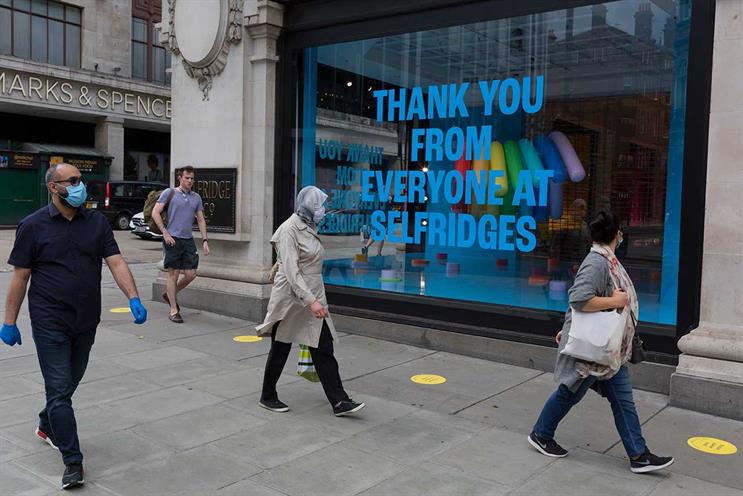
Shops in England selling non-essential goods will be reopening from 15 June, but with government guidelines in place to mitigate the risk of the spread of coronavirus, the landscape will look quite different to before.
"If footfall and dwell time have been two of the markers of retail success to date, that’s all set to change," Simon Hathaway, managing director EMEA of Outform, said. "Dwell time for customers is now how long they must spend in a queue outside the store and brands might want to target that moment to engage, rather than in-store, where the retailers don’t want to delay any purchase."
The government issued detailed guidance for retailers in May, with measures including limiting the number of customers allowed inside at one time, creating a space where people can maintain two metres' distance and frequently cleaning objects and surfaces.
With a limit on how many customers can be in its department stores, Selfridges devised an appointment system but plans to provide entertainment to entice consumers back to its physical locations. The luxury retailer revealed that on opening day local street performers will perform for customers as they enter the store, commissioned in partnership with the mayor of London. Selfridges will have dedicated entries and exits, Perspex screens installed at till points, in-store DJs and virtual beauty appointments.
Salome Bakpa, content marketing manager at Imagination, thinks the key to retail success will be in brands utilising the power of new digital technologies.
"Brands should look to harness new technology that allows them to bring joy to the retail experience as well as assist in sticking to hygiene standards. Augmented-reality apps (already proved a success by the likes of Ikea and Sephora) accessed either in-store or at home are a great way of doing this.
"It will be interesting to see if other companies, especially ones playing in the beauty space (where having an artist apply make-up to customers will be an absolute no go), will adopt this technology – making 'trying before you buy' totally contactless."
The operating restrictions of its beauty counters were considered by Estée Lauder, which in response has launched a skincare experience on WhatsApp. The experience, created by Rehab, is an artificial-intelligence-based chatbot called Liv, which can build a personalised skincare regime for users and remind them to stick to it.
Sage Appliances pivoted from in-store demonstrations to online masterclasses during the lockdown. Anna Brettle, founder of Stellar, which delivered the project, said it received high engagement rates that are testament to "consumers craving for the content and an immersive, engaging experience".
She continued: "We will start to see retailers incorporate these methods into physical stores by introducing video tutorials, mobile-payment solutions and digital wallets, which will begin to play an important role for brick-and-mortar stores.
"Consumers need a compelling in-store experience to attract them away from the familiarity of online and the safety of their homes."
To achieve their maximum potential, retailers will need to create a seamless experience with easy-to-follow store directions; have high hygiene standards to reinforce the feeling of safety; and begin engagement with consumers through different mediums from the moment they join the inevitable outdoor queue.


